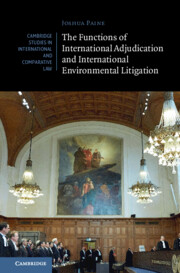Book contents
- The Functions of International Adjudication and International Environmental Litigation
- Cambridge Studies in International and Comparative Law: 189
- The Functions of International Adjudication and International Environmental Litigation
- Copyright page
- Dedication
- Reviews
- Contents
- Acknowledgements
- Table of Cases
- Abbreviations
- 1 Introduction
- 2 Adjudication in the World Trade Organization
- 3 Adjudication under the United Nations Convention on the Law of the Sea
- 4 International Court of Justice Litigation
- 5 Investment Treaty Arbitration
- 6 Conclusion
- Bibliography
- Index
- Cambridge Studies in International and Comparative Law
1 - Introduction
Published online by Cambridge University Press: 23 May 2024
- The Functions of International Adjudication and International Environmental Litigation
- Cambridge Studies in International and Comparative Law: 189
- The Functions of International Adjudication and International Environmental Litigation
- Copyright page
- Dedication
- Reviews
- Contents
- Acknowledgements
- Table of Cases
- Abbreviations
- 1 Introduction
- 2 Adjudication in the World Trade Organization
- 3 Adjudication under the United Nations Convention on the Law of the Sea
- 4 International Court of Justice Litigation
- 5 Investment Treaty Arbitration
- 6 Conclusion
- Bibliography
- Index
- Cambridge Studies in International and Comparative Law
Summary
Chapter 1 introduces the questions the book focuses on and explains its key contributions to literature on international adjudication. It introduces the three challenges facing international tribunals analysed throughout the book: managing change in applicable law or relevant facts, determining the appropriate standard and method of review when scrutinising State conduct for compliance with international law, and contributing to broader processes of dispute resolution. The chapter explains why the book focuses on environmental disputes, as such disputes lack a dedicated tribunal and are litigated across various regimes, and how it defines such disputes. It also justifies the choice of the four adjudication contexts focused upon (adjudication in the World Trade Organization, the UN Convention on the Law of the Sea, the International Court of Justice, and under investment treaties). The chapter also notes certain insights the book incorporates from methodological debates in comparative law, given its focus on identifying and explaining similarities and differences in how the three selected challenges are managed across the four adjudication contexts studied.
Keywords
- Type
- Chapter
- Information
- Publisher: Cambridge University PressPrint publication year: 2024

